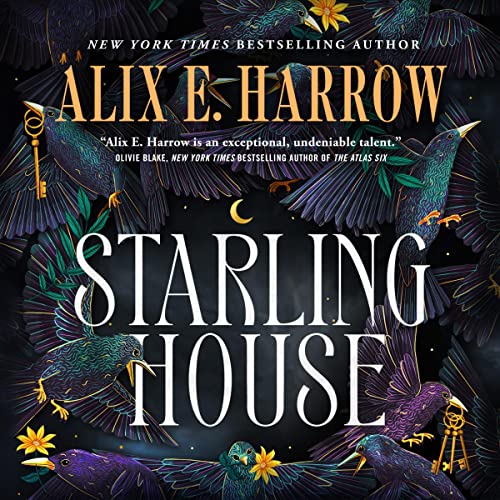 Starling House by Alix E. Harrow
Starling House by Alix E. Harrow Narrator: Natalie Naudus
Format: audiobook, eARC
Source: supplied by publisher via NetGalley
Formats available: hardcover, paperback, ebook, audiobook
Genres: Dark Fantasy, Gothic, horror
Pages: 320
Length: 12 hours and 26 minutes
Published by Macmillan Audio, Tor Books on October 3, 2023
Purchasing Info: Author's Website, Publisher's Website, Amazon, Barnes & Noble, Kobo, Bookshop.org, Better World Books
Goodreads
I dream sometimes about a house I’ve never seen….
Opal is a lot of things―orphan, high school dropout, full-time cynic and part-time cashier―but above all, she's determined to find a better life for her younger brother Jasper. One that gets them out of Eden, Kentucky, a town remarkable for only two things: bad luck and E. Starling, the reclusive nineteenth century author of The Underland, who disappeared over a hundred years ago.
All she left behind were dark rumors―and her home. Everyone agrees that it’s best to ignore the uncanny mansion and its misanthropic heir, Arthur. Almost everyone, anyway.
I should be scared, but in the dream I don’t hesitate.
Opal has been obsessed with The Underland since she was a child. When she gets the chance to step inside Starling House―and make some extra cash for her brother's escape fund―she can't resist.
But sinister forces are digging deeper into the buried secrets of Starling House, and Arthur’s own nightmares have become far too real. As Eden itself seems to be drowning in its own ghosts, Opal realizes that she might finally have found a reason to stick around.
In my dream, I’m home.
And now she’ll have to fight.
Welcome to Starling House: enter, if you dare.
My Review:
They’ve been telling stories about Starling House and the woman who built it, Eleanor Starling, since Eleanor first came to Eden over a century and a half ago. Some of those stories are even halfway true – but it doesn’t matter because no one in Eden has ever cared about the truth if that truth made them the least bit uncomfortable.
They’ve been telling stories about Opal and her mother Jewel since the day they came to town, too. And even though her mother drowned a decade ago, they’re still telling stories about her too. But mostly, they tell stories about Opal, and most of those are halfway true, too.
One of the stories that no one tells about Opal, because she never reveals truths about herself to anyone at all if she can help it, is that she’s more haunted by Starling House than anyone else in town – because the rest of them just complain about the eyesore, and the bad luck it brings to Eden. While Opal has been dreaming that Starling House was HERS, and has been dreaming those dreams since she was a little girl whose only even somewhat permanent address has been Room 12 at the Garden of Eden Motel since her mom brought her and her little brother Jasper to Eden.
Opal never knew that her mother brought them back to the only home that Jewel had ever known. At least, not until Opal lied, cheated, and inveigled her way into a job at the broken down and dilapidated Starling House. A job that looked to rival Hercules’ task of cleaning the Augean stables.
But Opal doesn’t care. Because Starling House seems to want her there – even if the current Starling, Arthur, claims that he doesn’t. But the house is true because it needs her, and Arthur is lying because of the same damn reason.
While the vultures that have always circled Starling House see Opal’s lies and secrets as a lever they can use to finally pry their way into a place where their dreams will come true.
Someone should have been careful what they wished for, because they’re about to get it.
Escape Rating A-: Starling House sits at the confluence of the River of Dreams and the Stuff of Nightmares, at the four-way stop between the darkest of dark fantasy, outright horror, the angstiest of angsty romance and power corrupts, catty-corner to the Inn of No One Believes the Truths that Women Tell because it’s inconvenient for their wallets, their consciences or even just their privilege.
At first, it’s Opal’s story, a story that is considerably more honest from the confines of her own head than it appears to anyone on the outside, but Opal lies like she breathes – especially to herself. Sometimes she even does as good a job of convincing herself as she does everyone else, but there are always cracks in the facade in her own head. Even if she can’t admit it.
The only love and the only weakness that Opal will admit to is her younger brother Jasper. She will do anything – and everything – to get him safely out of Eden. Because he’s been the only sunlight in her world since their mother drove her car into the river and drowned. And Eden is slowly killing him. Not just his spirit, although probably that too, but literally. Jasper has asthma, they have no health insurance and sometimes not enough for groceries, and the power plant has never met an environmental regulation that they haven’t bribed someone to let them off the hook for. The air is toxic and the whole place is a cancer cluster and Jasper needs to be somewhere else – even if Opal can’t make herself go with him
But Opal also has a weakness for Starling House and the children’s classic, The Underland, that the house’s first owner wrote from within its walls. Starling House captures her dreams, and she can’t resist following those dreams in waking life.
Which is where this story catches her and drags us all down to Underland with her.
Starling House takes all the elements of a gothic romance; the dark and creepy house concealing secret rooms and family secrets, an uber angsty romance between star-crossed would-be lovers both believing they’re not worthy of redemption, adds in myths and monsters from the depths of the imagination, sets it in a hard-scrabble, hard-luck town and then takes the whole story through a metamorphosis when the truth quite literally sets everyone – or at least everyone worthy – free.
Even if more of those people than would ever have imagined at the beginning of this descent into dreams choose to take their hard-won freedom and spend it in that same hard-luck town that might just have won a freedom of its own.
So, even though the angst of the romance sometimes goes way over the top, described in overblown language of desire and denial – at least within the confines of Opal’s head – and if the monsters and the myths turn out to be relics of bad choices and just desserts, the story of Opal, and Arthur and Eleanor descending down into Underland takes the reader along for the wildest of wild rides. Often in the wake of the Wild Hunt itself.
And even if some of both Opal’s and Eleanor’s secrets become obvious to the reader very early on, the journey is still well worth taking with them.
 I took this journey in audio, with Natalie Naudus as the most excellent narrator. As a narrator, she seems to specialize in heroines who think that everything is all their fault and that they have to do it all alone, and her voice made me think of her other characters, Emiko Soong in Ebony Gate, Zelda in Last Exit, and Vivian Liao in Empress of Forever. Opal is a fine addition to that illustrious company of women who stand on their own two feet but ultimately get by with a little help from their awesome, kickass friends.
I took this journey in audio, with Natalie Naudus as the most excellent narrator. As a narrator, she seems to specialize in heroines who think that everything is all their fault and that they have to do it all alone, and her voice made me think of her other characters, Emiko Soong in Ebony Gate, Zelda in Last Exit, and Vivian Liao in Empress of Forever. Opal is a fine addition to that illustrious company of women who stand on their own two feet but ultimately get by with a little help from their awesome, kickass friends.
I loved the author’s Fractured Fables, A Spindle Splintered and A Mirror Mended, so I’m looking forward to her next book whenever it appears. I already have Natalie Naudus’ next narration in my TBR/TBL (To Be Read/To Be Listened) pile in The Dead Take the A Train.

 Starter Villain by
Starter Villain by  Escape Rating A: Charlie starts out Starter Villain in WAY, WAY over his head. Part of his charm is that he never loses sight of that fact. He’s always aware that he hasn’t got a clue, and isn’t likely to get one any time soon, and is secretly panicking about it every other minute. Which is a big chunk of why we like him and end up rooting for him so hard, because his inner voice is asking the same questions that a lot of us would be asking in his place.
Escape Rating A: Charlie starts out Starter Villain in WAY, WAY over his head. Part of his charm is that he never loses sight of that fact. He’s always aware that he hasn’t got a clue, and isn’t likely to get one any time soon, and is secretly panicking about it every other minute. Which is a big chunk of why we like him and end up rooting for him so hard, because his inner voice is asking the same questions that a lot of us would be asking in his place.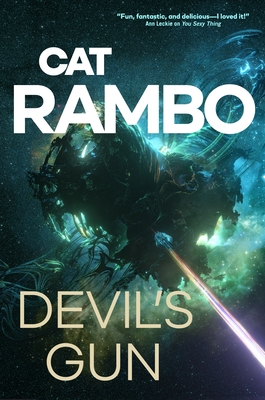 Devil's Gun (Disco Space Opera #2) by
Devil's Gun (Disco Space Opera #2) by  Escape Rating B: I picked this up because I enjoyed the first book in the series,
Escape Rating B: I picked this up because I enjoyed the first book in the series, 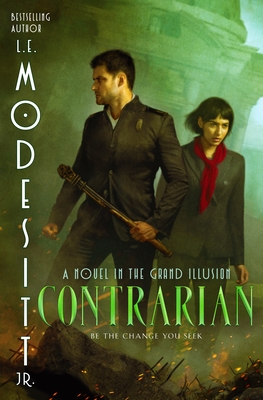 Contrarian (The Grand Illusion #3) by
Contrarian (The Grand Illusion #3) by 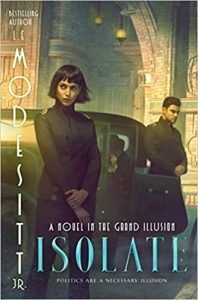 The first book in this series,
The first book in this series, 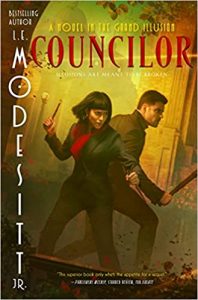 Escape Rating A+: This series is my catnip. I could read about Steffan’s work day, his colleagues, his attempts to maneuver around a great many of them, and the crises in his country that he tries to prevent, pretty much all day long.
Escape Rating A+: This series is my catnip. I could read about Steffan’s work day, his colleagues, his attempts to maneuver around a great many of them, and the crises in his country that he tries to prevent, pretty much all day long. 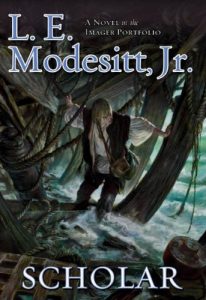 The progress of the series so far reminds me a lot of the author’s
The progress of the series so far reminds me a lot of the author’s 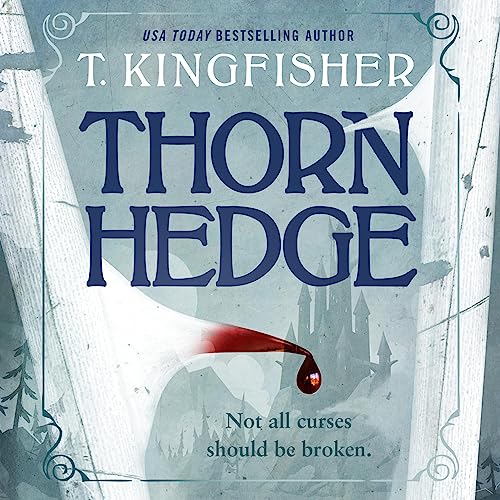 Thornhedge by
Thornhedge by 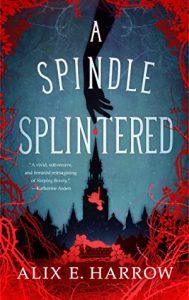 Escape Rating A: Thornhedge is a fractured fairy tale. In fact, Thornhedge and
Escape Rating A: Thornhedge is a fractured fairy tale. In fact, Thornhedge and 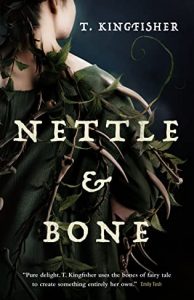 Or in my case, reread.
Or in my case, reread. 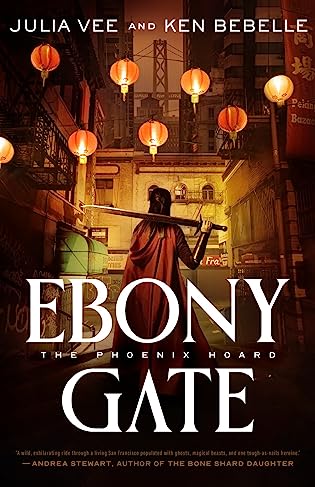 Ebony Gate (Phoenix Hoard, #1) by
Ebony Gate (Phoenix Hoard, #1) by  (There are also touches (or more) of
(There are also touches (or more) of  That being said, I want to give a big shoutout to the narrator, Natalie Naudus, who also narrated Max Gladstone’s
That being said, I want to give a big shoutout to the narrator, Natalie Naudus, who also narrated Max Gladstone’s 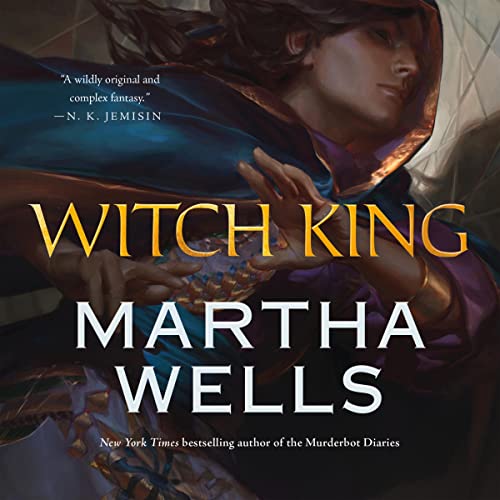 Witch King by
Witch King by  I believe that just how much anyone will like Witch King depends on what you were expecting from it. If you’re looking for more
I believe that just how much anyone will like Witch King depends on what you were expecting from it. If you’re looking for more  Red Team Blues (Martin Hench) by
Red Team Blues (Martin Hench) by  Our Lady of Mysterious Ailments by
Our Lady of Mysterious Ailments by  Escape Rating A+: Our Lady of Mysterious Ailments is just like
Escape Rating A+: Our Lady of Mysterious Ailments is just like 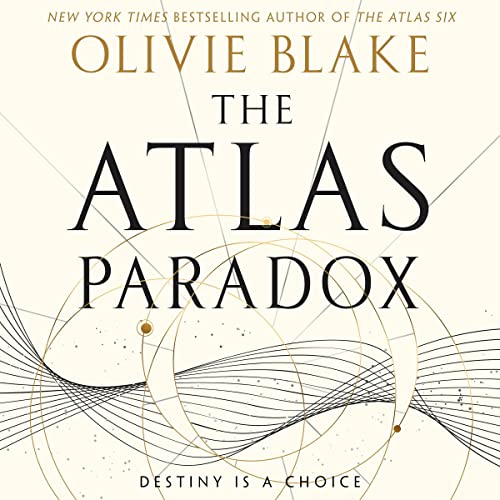 The Atlas Paradox (The Atlas, #2) by
The Atlas Paradox (The Atlas, #2) by  This story of dark academia, utter corruption and potentially the end of the world follows directly after the events of
This story of dark academia, utter corruption and potentially the end of the world follows directly after the events of  The Atlas Six
The Atlas Six